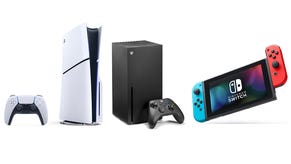Oculus' high PC specs are Sony's chance to shine
With PC VR looking like it'll be a high-end niche for years, Morpheus gets first shot at mass-market VR
It is with absolute confidence, and yet a heavy heart, that I say that I won't be getting an Oculus Rift when the consumer model of the headset arrives early next year. This is a reversal of what I'd have told you just last week. I've spent months justifying a headset and the hardware required to run one to myself; each time I've visited a developer and tried out their demo, each time I've been to a trade show and slipped on a Rift prototype to immerse myself in something new and fascinating, my excitement has mounted. I think I'm very much the kind of person to whom this sort of tech appeals; but I won't be getting one, not for quite a long while.
You can probably guess why, if you've been following the news. Oculus announced the minimum hardware specifications required for the Rift a few days ago, and they are... High. Eye-watering high. An NVIDIA GTX 970; an Intel i5-4590 chip. Oh, and forget about laptops, pretty much. Even if they meet those specifications (which even most high-end gaming laptops don't), you need your HDMI port hooked directly up to the GPU, as I understand it, and most laptops don't work like that. Even allowing for six months for component prices to descend as new hardware enters at the top of the market, I'm looking at the best part of two thousand dollars to equip myself with a PC like that - like a great many people, I suspect, I'd be starting from scratch on the whole thing, without any old PCs lying around to scavenge a monitors or PSU from. That's two grand before I even buy an Oculus Rift, or any games to play on it.
"What this might mean to Oculus and to VR on the whole is that a product we all knew would be niche is going to be... restricted to a thin slice at the upper end of what's (mostly) ironically termed the PC Gaming Master Race"
So I won't buy one - not when it launches, not next year at all. By mid to late 2017, perhaps, I'll be in a position where I might think about it again, although it'll likely be conditional upon the issue with laptops being fixed; having to find somewhere in my apartment to set up a hefty desktop PC is honestly an even bigger killer than the financial issue. I'm disappointed, certainly, but the whole thing has also quite honestly dampened my enthusiasm for the tech somewhat - even as I recognise that if Oculus' calculations are correct, then there's honestly no alternative to the specs they've cited. Hard technological limits do not make way for the feelings of disappointed consumers.
I'm cautious about extrapolating from my own experience to the broader market, but at the same time, I know I'm not going to be alone in this situation. Gaming laptops have taken over a lot of ground from desktops in recent years; they're all out of the question, as are all Mac laptops and desktops, which are also far more popular today with gamers and developers than they've ever been. Lots of people are facing building or buying a system from scratch if they want to play VR games; lots of them might not be remotely happy with the form factor (desktop vs laptop) or OS (Windows vs OS X) involved in that. It's a big, big hurdle to jump, even for an early adopter.
What this might mean to Oculus and to VR on the whole is that a product we all knew would be niche is going to be far more niche than we expected, for far longer than we expected. It's going to be restricted to a thin slice at the upper end of what's (mostly) ironically termed the PC Gaming Master Race; the rest of the market, even the core gamers and early adopters, are going to arrive within Oculus' sights only very gradually, as component prices fall and average PC specs rise. It's a conundrum for developers who have been aiming at VR, too; although their initial market is going to be made up of rather wealthier gamers than they'd expected, it's also going to be much, much smaller and significantly more slow-growing than anticipated. It wouldn't be entirely surprising to see several studios reevaluating their budget and resource allocations to VR projects in the coming weeks and months, as they recalculate just how long it's going to be before Oculus can provide a viable market.
On the other hand, Oculus isn't the only player in the VR market any more; they're not even going to be the first to market, with Valve and HTC's Vive headset likely to be the first serious contender to hit the market, towards the end of this year. Valve hasn't announced recommended PC specifications for Vive as yet, which has allowed Oculus to set expectations; whether Vive follows suit with a high recommended spec, or Valve decides to differ significantly with Oculus over this point, will be extremely interesting to watch.
One possibility is that Oculus' specs don't just represent a technical necessity but a - somewhat subjective - statement of position on the types of experience VR should provide. Something which a number of VR developers have stated is that the technology at present lends itself not to the kind of photorealistic, "Crysis 3 but in VR" style experiences that some may dream of; rather, that it works best with more simple and highly stylised graphics and artwork. There's a strong logic behind that claim; aside from the fact that a consistent framerate seems to be much more important than anything else in a VR experience if motion sickness is to be avoided, it also makes sense that the brain might be more willing to accept immersion in a stylised world than in a "realistic" one suffering badly from uncanny valley effects. Now, it's possible that Oculus has based its high specs off the requirement even for simple VR titles - we simply don't know - but if those specs reflect instead the requirements of modern high-end 2D games rendering as VR games, that's actually quite a blunt statement of intent and ideology on the part of Oculus.
"No pressure, Sony, but if you mess this one up, the market might not give it another chance for many years to come"
It's possible that Valve may go a different direction, encouraging developers to embrace simplicity and build VR games that still give a perfectly good, frame-locked experience on significantly lower-spec hardware. That would be extremely interesting, and a little worrying, suggesting a rift (no pun intended) between the two emerging VR giants which is as much ideological as technological. Alternatively, Valve may match Oculus' specs, essentially confirming that PC VR is going to be a niche rich man's toy for the next couple of years, at least.
What of Sony, in all of this? Oculus' specs blow the PS4, to which the Morpheus headset is tethered, out of the water; the PS4 can undoubtedly claw back some of that gulf in raw power thanks to its fast RAM, tightly integrated architecture and so on, but it's still pretty clear that games developed with Oculus' spec in mind aren't going to run on PS4 and Morpheus without major changes. This, too, could go two ways. PS4 could turn out simply to be underpowered for VR; that's the fear of many in the wake of Oculus' announcement, although it's clearly not a fear shared by Sony, which has shown off many impressive tech demos of Morpheus in action. Alternatively, PS4 could turn out to be a platform with a different vision for VR - one which may, yes, focus on simpler and more stylised games, but which may be a much more realistic way to ease a broader market into the notion of VR than thousands of dollars worth of hardware pumping the very latest 3D graphics into a headset.
One thing is certain; unless Valve has a very big surprise in store for Vive's recommended specs, Sony is going to have absolutely the only VR solution at a consumer-friendly price. Morpheus will probably launch after its competitors on PC, but this is looking increasingly like an unimportant handicap; if Morpheus is reasonably priced and actually works, even within more strict limitations than its PC rivals; if Sony can support it properly with first- and third-party games, rather than sending it out to die as it did with PS Move and EyeToy; then Morpheus will have an unchallenged run at mass-market VR for at least a year or so, untroubled by the vastly more expensive rivals floating around the top of the PC market. This is, potentially, a huge opportunity for Sony. It also puts far more onus on Sony not to mess up the VR market with a headset that overshoots and under-delivers; it won't take too much motion sickness to put VR back to bed for another generation. No pressure, Sony, but if you mess this one up, the market might not give it another chance for many years to come.









